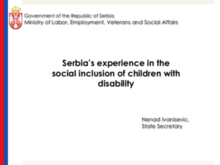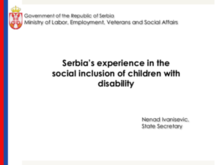Demographic Data
|
Sources: World Bank, UNDP, UNAIDS, DHS 2013 |
Displaying 11991 - 12000 of 14391
In this documentary, Martin Sixsmith undertakes an investigative journey to determine the role of the Irish Catholic Church in the adoption “trade” that led thousands of children of unwed parents to be separated from their mothers and adopted abroad.
A Documentary film investigating the Irish Catholic Church's role in an adoption trade which saw thousands of illegitimate children taken from their mothers and sent abroad, often with donations to the Church flowing in the other direction.
Interested and qualified candidates should send their applications with updated UN Personal History Form P11 and updated CV, attaching copies of academic certificates by 16 September, 2014.
UNICEF Somalia Office invites proposals from external universities to support the development of a programme and curriculum for Under-Graduate Diploma, a Bachelor of Social Work and a Post-Graduate Diploma in Social Work, in addition to capacity building of Faculty Staff, both academic and administrative.
Près de 30 pour cent de tous les enfants en situation de handicap en Russie vivent dans des orphelinats de l'État où ils sont parfois en proie à la violence et la négligence, a déclaré Human Rights Watch dans un rapport publié aujourd'hui. La Russie devrait mettre fin au mauvais traitement des enfants en situation de handicap dans les services de l'État et faire une priorité du soutien fourni pour que les enfants handicapés vivent avec leurs familles ou dans d'autres environnements familiaux, plutôt que dans des institutions.
UNICEF Armenia office is looking for a local consultant to undertake rapid assessment of 14 child care residential institutions under the Ministry of Labor and Social Affairs to determine their current situation for capturing GOAM transformation prospects for those institutions.
On 10 September 2014, UNICEF and the Permanent Mission of Bulgaria co-hosted a high level lunchtime discussion on the right of children below three years to live in a caring and supportive family environment: examples from Central and Eastern Europe and Central Asia. Kazakhstan showed how the integration of social workers and outreach services in the health sector is reducing baby abandonment in pilot areas of the country.
On 10 September 2014, UNICEF and the Permanent Mission of Bulgaria co-hosted a high level Lunchtime Discussion on the right of children below three years to live in a caring and supportive family environment: examples from Central and Eastern Europe and Central Asia. Serbia focused its presentation on the support provided to families of children with disabilities and the importance of investing in family-support services at municipal level.
On 10 September 2014, UNICEF and the Permanent Mission of Bulgaria co-hosted a high level Lunchtime Discussion on The right of children below three years to live in a caring and supportive family environment: examples from Central and Eastern Europe and Central Asia. Serbia focused its presentation "Serbia’s Experience in the Social Inclusion of Children with Disability" on the support provided to families of children with disabilities and the importance of investing in family-support services at municipal level.
The Better Care Network (BCN) and the Child Protection Monitoring and Evaluation Reference Group (MERG) organized a two-day round table meeting between 9-11 September 2014, to explore how data regarding the living and care situations of children can be better used to provide insight into their vulnerability, and to guide more targeted policies, services and interventions on their behalf.




